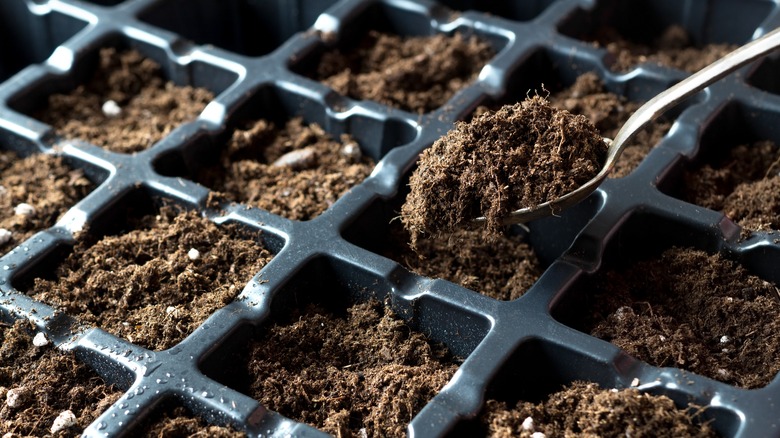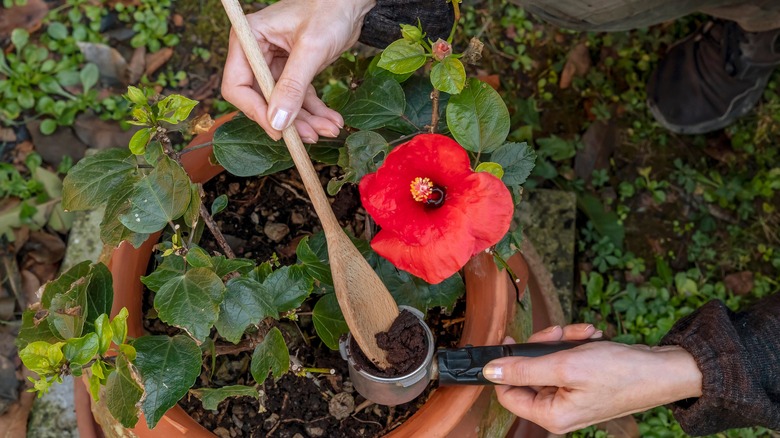Why You Should Add A Kitchen Spoon To Your Gardening Toolkit
You've probably already thought of this idea or maybe come across it online: A creative way to repurpose wooden spoons in your garden is to upcycle them into plant markers. In fact, spoons have a ton more practical uses in the garden than simply acting as signposts. We use spoons in the kitchen everyday for eating and cooking. They're notably made to weather pretty harsh conditions, from banging around in a pot under high heat to withstanding the whirlwind of water in our dishwashers. And, in your garden, you can use them to scoop soil and fertilizer, transplant seedlings, sow seeds, and even direct rainwater away from your foundations.
For one, spoons are made of all sorts of durable materials, from metal, wood, and ceramic to plastic and silicon, which is handy when considering ideas for re-use in the garden. They also have a shovel-like scoop on one end attached to an ergonomic handle. You'd be hard-pressed to find a more comfortable tool. They come in an enormous array of sizes, from teeny teaspoons to expansive serving spoons, and are widely available. Source from your own kitchen, local Buy Nothing groups, thrift stores, and yard sales. Or, of course, you can buy them new from just about any homewares store — think Walmart or Dollar Tree for budget options.
Sow your teeniest seeds with a spoon
Spoon in hand, it's time to start taking advantage of its scooping power. For example, here's a clever way to repurpose plastic silverware around the garden: Use a spoon to scoop up and sow small seeds, similarly to a purpose-designed seed spoon. If you tap the handle lightly with one finger, you can dispense a single or a few seeds into a trough or hole at a time. Petite spoons, like teaspoons, work best for picking seeds out of tight packets and depositing them one or two at a time into the teeny pots of seedling starter trays. Larger dessert spoons, meanwhile, are great for bigger seeds and sowing seeds directly into garden beds.
On that note, you could also drag the back of a metal spoon through the soil to easily create the seed-sowing trenches or channels you require. A spoon also makes perfect-sized holes for planting all those popular summer bulbs you can't wait to add to your garden. We already mentioned making seed markers from wooden spoons, but you can also utilize metal spoons for this purpose by writing plant names on them using a permanent marker, your Cricut, or even stamping them into the metal.
Spoons make ideal weeders, pest control devices, and kids' gardening tools
Once your seeds sprout into seedlings, reach for your spoon again, this time to help you delicately transplant the babies into a bigger planter or the ground. A blunt, curved spoonhead is perfect for loosening roots without damaging them, gently prying out delicate seedlings, and carrying them over to their new home — be it container or garden. Finally, use your spoon to gently push any disturbed soil back around the base of the plant. You can also, of course, use a spoon to measure and distribute small portions of pest control, like slug and snail repelling diatomaceous earth, and soil amendments, like the fertilizer needed by seedlings after the six-week mark.
Are you always damaging your vegetables with a weeding hoe no matter how carefully you tread? Simply use a spoon to scrape away tiny weeds from around delicate stems and effortlessly save your edibles from nicks with sharp tools. A long-handled spoon even makes the ideal pest getter-offer for gardeners too squeamish to pick bugs off their beloved plants by hand. And finally, a spoon is the ideal first gardening tool for a toddler or child — the small handle fits snugly in their little hands and the edges of the scoop aren't sharp like a trowel's are. In fact, you can sell it to them as their very own garden trowel, just like the big plant people in their lives have!

